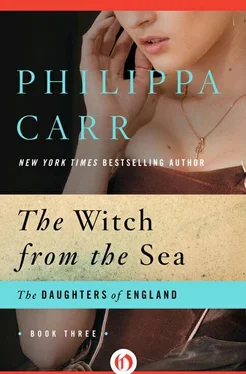She wanted to see the castle. I told her about Ysella and Nonna. “Ysella’s Tower is locked up. It is used as a kind of storage place. Seaward is where certain of the servants live.”
“A whole tower to themselves?” said my mother.
“There is so much space in a castle, Mother.”
“I remember the Abbey where I spent my childhood. It is very beautiful here, and so interesting. I like to think of my little girl as the châtelaine of a great castle.”
When I was showing her the rooms in the castle we came to the Red Room.
It was the first time I had been in it since that night when Colum had found me there. I noticed that there was a layer of dust on the planked hutch and the bedposts.
My mother noticed it too and raised her eyebrows. As she grew older she had become a meticulous housewife.
“The servants don’t like to come in here alone,” I said.
“The haunted room, is it? Now I see it has that air. What legend is there attached to this place?”
I said: “It was the room in which Colum’s first wife died.”
“Ah,” said my mother, “if I were you I would take down those red hangings and the bed curtains and put in another colour. Change it.”
“I hadn’t thought of that.”
“The old legends that should be preserved are happy ones,” said my mother.
“I will consider it,” I said. And I thought at the time: She is right in a way but changing the curtains and putting in new furniture would not alter the fact that within these four walls Melanie had lived, suffered and died.
After the New Year my parents went back to Lyon Court. I missed them very much, but I was happy watching my child grow bigger every day. He flourished and our delight in him was greater than ever. But oddly enough I could not cast out that morbid fascination which the Red Room had for me, and I still went there. I did think of changing the curtains. I even went so far as taking my little seamstress along to discuss the matter with her.
I noticed how reluctant she was and I could see that she was afraid of the task.
At last she admitted that she thought it might bring bad luck.
“Nonsense,” I said. “Why should it?”
“It might be, Madam, that this is how she wished it to stay.”
Then I knew that I should really do as my mother said. I must change the room entirely so that when people entered it they would not think of poor dead Melanie.
But I didn’t. I found I had no heart for the task. I assured myself that to do so was to give way to superstition. But that was not quite true.
Somewhere deep down in my mind was the thought that Melanie had left something of herself behind and that one day I might need her help.
I will admit it was a thought which flashed in and out of my head and was dismissed immediately, but it came back. It was there in the Red Room; and on dark nights I thought I could hear it in the murmur of the wind on the sea.
What if he should tire of you as he tired of Melanie? Tire of me? The mother of his son … and the other children we should have. For we should have them. He was sure of that and so was I.
There was a great deal I had to discover about my husband. I knew so little of him. That was doubtless why I was so fascinated by him.
Ruthless I knew he was. How ruthless I had to discover. Brutal he could be. How brutal? I was safe while I pleased him. Had Melanie ever been? I could picture his bringing home his bride. I could see the wedding feast at Trystan Priory and the gentle girl who had been brought up in that kindly mansion and knew nothing of the harsh reality of life.
Had he been tender towards her once? I could picture his indifference to her suffering. I remembered him as he had been in the inn when there had been nothing but lust in his eyes for me.
He excited me; he fascinated me; but I knew I did not understand him; and I knew too that I could only rely on his goodness to me as long as I continued to please him.
I would keep the Red Room as it was and I would attempt to learn more of my husband. I must know where he went when he was not at the castle. I must share his life.
I would find out. Oddly enough—and how right this premonition was to prove—the notion filled me with a certain apprehension.
Spring had come and I was once more expecting a child. I was delighted but not more so than Colum.
“Did I not tell you that you would have a quiverful? Give me another boy. When we have half a dozen of them we’ll think about a girl or two.”
I retorted: “I do not propose to spend my life in a continual state of pregnancy.”
“Do you not?” he retorted. “I thought that was a wifely duty.”
“To provide a few children yes, but she needs a little respite.”
“Not my wife,” he said, and he lifted me in his arms and looked at me with love.
I was happy. Gloomy thoughts had gone. I visualized a future—Colum and I grown older, more sedate, and our children playing about us.
As soon as I knew I was to have another child my desire to discover receded. I was happy. I wanted to go on in my contentment. There were times when he went away for several days at a stretch. I used to wonder where. He was not very communicative about his affairs; and one thing I had discovered was that he hated to be questioned. When I had asked he had answered me vaguely but I had seen the danger signals in his eyes. I had seen his sudden anger flare up against some servant and I had always been afraid of arousing it. At one time I wondered whether he visited a mistress. I did not think this was so because when he went away he took a retinue of servants with him.
Again I learned a little through Jennet. She was supposed to sleep in the servants’ quarters in the Crows’ Tower but I knew she slipped out to Seaward to join her lover there. One night I discovered that she was not going to Seaward Tower.
Colum had told me that he would be leaving early the next morning. He was going on some business and would be gone before I was up.
I remembered then that Jennet had not gone to the Seaward Tower on another occasion when Colum had been going away. I decided to question as discreetly as I could, because I was growing more and more interested in Colum’s journeys.
When I awoke the next morning I sent for Jennet. I said: “I gathered you spent the night on your lonely pallet, Jennet.”
She blushed in that manner which had sometimes irritated my mother but which I could not help finding rather endearing.
“Orders,” she said. “I was not to go to Seaward last night.”
“There should be such orders every night, Jennet,” I said.
“Yes, Mistress,” she answered. “’Tis always so,” she volunteered, “the night before he do go on his journey. He be busy preparing, like, late into the night and sets off with the dawn.”
“Does he tell you where he is going?”
“He never will say, Mistress. Shuts up tight when I ask. He’s a mild man but he gets angry if I as much as mention it. ‘Keep thy mouth shut, woman,’ he says, ‘or that’ll be the end ’twixt you and me.’ Yet he be a mild man in all other matters.”
It certainly was strange. I wondered why there had to be this secrecy. Colum was not a man to make an effort to keep anything quiet. His implication was that if people did not like what he did, he cared not a jot. Yet he was quiet about this business of his.
When he returned from a journey he was invariably in good spirits and glad to be back with me. It was June and the warm sunshine filled the castle. It was three months since my child had been conceived and I had recovered from the first uncomfortable stages of pregnancy and had not yet reached the cumbersome one. I felt well and energetic and Colum and I rode out together. We should be away for the night, he told me, as he had some business to transact.
Читать дальше












